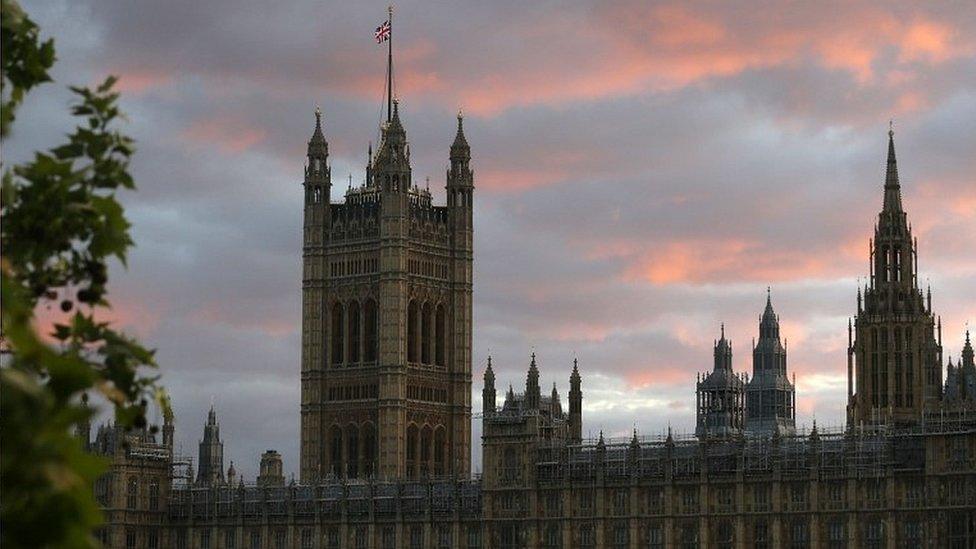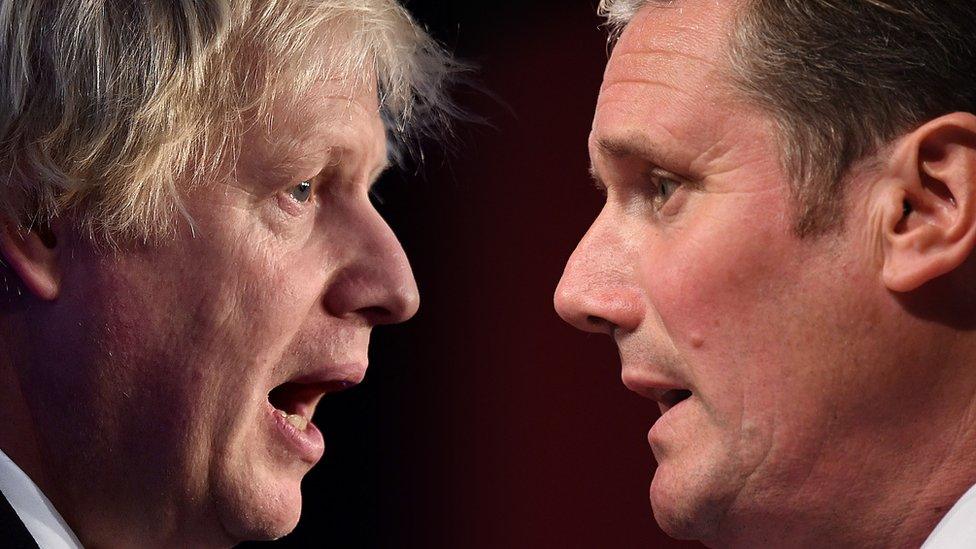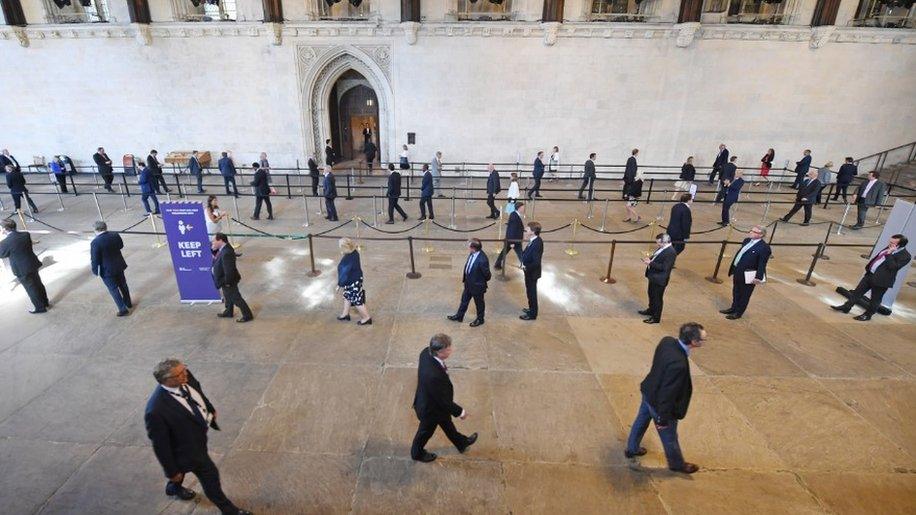The week ahead in Parliament
- Published

A bit of normal Westminster politics seems to be seeping back into the pandemic Parliament, with the government facing a couple of possible defeats in the Lords, a cabinet minister facing a difficult question time in the Commons, and the faith, family and flag wing of the Conservative Party on manoeuvres over divorce reform.
Plenty of important law-making continues, not least Commons and Lords debates on the regulations which will ease the lockdown.
And, as has been the pattern throughout the pandemic, some of the biggest events will be policy announcements made in ministerial statements, which are dropped into the agenda at the beginning of each day.
But it's still not business as usual - in the Commons 135 MPs will cast their votes by proxy, mostly via their whips.
Meanwhile in the Lords, the first remote vote could be held on 15 June, when the opposition parties will be pushing amendments to the Extradition (Provisional Arrest) Bill and regulations on access to abortions in Northern Ireland are due to be considered. A final test vote (on whether salt and vinegar was the best flavour for crisps) was deemed a success this week.*
Various bits of Commons normality are being restored.
Backbench business committee debates have been restarted - with Labour's Dawn Butler leading a debate on Black lives Matter on Thursday - and backbenchers can now apply for debates in the chamber on the public spending of government departments, in effect choosing the subjects of the Estimates Day debates due in early July.
This is the moment when MPs approve government spending plans, and is one of their few opportunities to even comment on them, let alone exercise any traction.
And the consideration of Private Members Bills will resume in July, after the resolution of a stand-off about the scheduling of the Friday sittings in which they are debated.
Here's my rundown of Westminster's week ahead:
Monday 15 June
The Commons opens (14:30) with housing, communities and local government questions - expect more attacks on Secretary of State Robert Jenrick, over the planning row he has become embroiled in, especially since he declined to respond in person to an urgent question on the matter. As ever, any ministerial statements and urgent questions will follow from 15:30.
Then MPs rattle through a series of motions to approve Statutory Instruments. The Electricity Capacity (Amendments etc.) (Coronavirus) regulations makes adjustments to the working of the electricity supply market; and the Environmental Protection (Plastic Straws, Cotton Buds and Stirrers) (England) regulations ban the supply of such items by business.
The big one is the Health Protection (Coronavirus, Restrictions) (England) (Amendment) (no.3) regulations, which allow the gradual relaxation of the lockdown, whilst revising place public health measures to continue to reduce health risks. Among other things, they allow the re-opening of some non-essential shops and outdoor markets.
They replace regulation six, on not leaving home without a reasonable excuse, with a regulation to provide that no person may stay overnight at any place other than their home without reasonable excuse.
They also introduce new rules on outdoor gathering and provide new rules on indoor public gatherings of two people or more from different households.
Then comes the Fatal Accidents Act 1976 (remedial) order - which is the result of a Court of Appeal judgement that people who had lived with a partner are entitled to bereavement damages under the Act; the order sets a qualifying period of two years of cohabitation.
On the virtual committee corridor, public accounts (14:30) has an important-looking session with top civil servants on whole of the government's response to coronavirus.
In the Lords (14:30), questions to ministers range across government support for journalists and politicians in Northern Ireland who have received death threats from paramilitary groups, the membership of the committee to review the Fixed-term Parliaments Act. and government action to prevent any increase in child poverty during the pandemic.
The day could see a number of votes; first on the Third Reading of the Extradition (Provisional Arrest) Bill , where there are two major amendments, one led by Labour's Lord Kennedy and another led by the Lib Dems' Lady Hamwee.
Both are about the process the government will follow when adding further territories to the Act. Labour's is an attempt to put in place guarantees which would stop the government from extraditing to human rights abusers; with any extradition treaty their amendment would require consultation, risk assessment, and a statement by the home secretary.
Expect another vote on the Abortion (Northern Ireland) (No. 2) Regulations 2020 - which will permit abortion services to be provided in Northern Ireland. There is strong opposition to this from the DUP.
And there should also be substantial debate on the Health Protection (Coronavirus, Restrictions) (England) (Amendment) (No. 2) Regulations 2020.
Tuesday 16 June
The Commons opens (11:30) with business, energy and industrial strategy questions.
The rather technical looking ten minute rule bill on automatic electoral registration proposed by Labour's Judith Cummins is in fact very politically salient.
She wants to revamp the way the electoral register is compiled, so that instead of relying on individual voters filling out a form, it draws on a variety of datasets compiled by government - benefits and pensions records, drivers' licences, passports etc.
With the government set to launch a redrawing of Parliamentary boundaries according to a strict population quota, she will argue that a modernised system would include people missed by the existing process - which was one of Labour's main criticisms of the redrawing exercise.
Then there will be an opposition half day debate on a Labour motion, yet to be announced.
Finally, there are two more statutory instruments for MPs to approve: the Over the Counter Derivatives, Central Counterparties and Trade Repositories (EU Exit) regulations and the Public Service Vehicles (Open Data) (England) regulations.
On the committee corridor, public administration and constitutional affairs (09:30) takes evidence on the response to Covid-19 and the Coronavirus Act 2020. The special defence sub-committee on the security of 5G (14:30 pm) hears from US witnesses including Congressman Mike Turner.
Justice (14:30) continues its inquiry into children and young people in custody, with evidence from HM chief inspector of prisons Peter Clarke and others. The focus will be the large and growing proportion of detained children from ethnic minority backgrounds.
International development (14:30) hears from a panel of witnesses, headed by Dr Tamsyn Barton of the Independent Commission for Aid Impact, about the humanitarian impact of the pandemic. Digital, culture media and sport will continue its inquiry into the future of public service broadcasting, with senior figures from the BBC and Channel 4.
Health and social care (09:00) will explore the impact of the pandemic on patients as well as health providers with two panels of witnesses. The first will focus on dentistry, emergency medicine and care, and surgical practice, hearing a patient's experience of accessing surgical treatment during the pandemic first-hand. The second panel will look at strategic and practical challenges.
In the Lords (11:00), ministers will be questioned on the publication of the social housing white paper and reviewing the government's manifesto commitments as a result of the pandemic.
The interesting thing about this is the questioner - Lord Young, former chief whip and, until last August, a government spokesman for the Cabinet Office in the Lords. There are few more experienced ex-ministers than he, so is this about whether the financial implications of the pandemic may force ministers to abandon commitments on taxes and the "triple lock" on state pension increases?
The main legislative business is the committee stage consideration of the Corporate Insolvency and Governance Bill - the emergency pandemic measure which gives endangered companies a 20-day moratorium on debt recovery measures, to give them a chance to find new investors or restructure. As ever in Lords committee stage debates, it is rare for anything to be pushed to a vote, but there are a number of amendments down to put a time-limit on the moratorium provisions or review them, signalling where the debate may focus.
Finally, the Lords communications and digital committee (15:00) has what promises to be an interesting session on the future of journalism starring Fraser Nelson, editor of The Spectator; Jason Cowley of the New Statesman; ITV's Julie Etchingham; and former Downing St communications boss (and ex-BBC editor) Sir Robbie Gibb. Bring popcorn.
Wednesday 17 June
The Commons opens (11:30) with women and equalities questions, followed at noon by Prime Minister's Questions.
The day's Ten Minute Rule bill, from the Conservative former sports minister Tracey Crouch, aims to extend legislation on people in a "position of trust," for example teachers, to provide safeguards against abuse perpetrated by sports coaches. This was something she had pushed for as minister, but, she says, it "got stuck" in the Ministry of Justice. She wants to hear what the MoJ plans are to close the loophole and when. This is part of a continuing Commons campaign - she raised the issue in a Westminster hall debate in March., external
Then MPs turn to detailed scrutiny of the Divorce, Dissolution and Separation Bill.
Most of the amendments are proposed by a group of Tory traditionalists - Fiona Bruce, Sir Edward Leigh, Sir John Hayes, Sally-Ann Hart and Sir David Amess - and make changes like extending the minimum legal period for a divorce from six months to one year, ensuring increased support for marriages and new support for couples where an application for divorce has been made to the court, and requiring a report on the impact of the legislation on divorce applications and marriage support.
Sir Edward Leigh also strikes out on his own with an amendment to adopt in England and Wales the approach currently available in Scotland, allowing a no-fault divorce to be granted on consent grounds in just one year.
There's a great deal of select committee action: home affairs (09:30) has a session on the Macpherson Report: twenty-one years after it concluded that the investigation into the killing of Stephen Lawrence had been "marred by a combination of professional incompetence, institutional racism and a failure of leadership".
Elsewhere, the treasury committee (14:30) continues its inquiry into the economic impact of coronavirus, International trade (14:30) looks at UK trade negotiations with academic and think tank witnesses, plus the CBI, TUC and NFU; and the business, energy and industrial strategy committee (10:30) focuses on the impact of coronavirus on businesses and workers with witnesses from a series on trades unions: GMB Scotland, Unite, Equity, Prospect and Usdaw.
In the Lords (11:00), question time ranges across the UK's relationship with the government of China, and government action on Covid-19 as a result of the meeting of the scientific advisory group for emergencies on 10 February.
The main legislative action is the report stage consideration of the Private International Law (Implementation of Agreements) Bill - a measure which covers the handling of cross-border private disputes, such as child custody disputes between parents of UK and non-UK nationality.
Complaints about this legislation have been brewing through the committee stage, and amendments are likely to be pushed to a vote.
The former Labour lord chancellor, Lord Falconer, and the Lib Dem lawyer Lord Marks are attempting to remove the second clause of what is only a two-clause bill, which would delete the sweeping powers proposed to allow the UK, Scottish and Northern Ireland governments to make regulations about how they enforce international rulings.
Two influential Lords committees - the delegated powers committee and the constitution committee - have called for the clause to be taken out.
The latter called the powers in the bill "a matter of significant constitutional concern. It is inappropriate for a whole category of international agreements to be made purely by delegated legislation".
This doesn't quite gut the Bill because clause one has the important effect of incorporating three international agreements into UK law: the 1996 Hague Convention on Jurisdiction, Applicable Law, Recognition, Enforcement and Co-operation in Respect of Parental Responsibility and Measures for the Protection of Children; the 2005 Hague Convention on Choice of Court Agreements; and the 2007 Hague Convention on the International Recovery of Child Support and Other Forms of Family Maintenance.
Thursday 18 June
The Commons begins (09:30) with questions to the chancellor of the Duchy of Lancaster and minister for the Cabinet Office, AKA Michael Gove. Then comes the weekly Commons business statement from the leader of the House, Jacob Rees Mogg.
MPs will be asked to approve a series of SIs on the African Development Bank and the International Development Association, before moving on to a backbench business committee debate on the effect of Covid-19 on black and ethnic minority communities, led by Labour MP Dawn Butler.
The Scottish affairs committee (14:30) takes evidence on coronavirus and Scotland.
In the Lords (11:00), ministers field questions on the implementation of the Covid-19 track and trace system, and setting up an independent inquiry into the Post Office's Horizon accounting system. That one comes from the Conservative, Lord Arbuthnot, who has been a long-standing campaigner on the miscarriages of justice resulting from criminal prosecutions caused by the defects in the system.
Then, peers will be asked to approve a series of SIs: the Civil Aviation (Insurance) (Amendment) (EU Exit) Regulations 2020; the Over the Counter Derivatives, Central Counterparties and Trade Repositories (Amendment, etc., and Transitional Provision) (EU Exit) Regulations and the Financial Services (Miscellaneous Amendments) (EU Exit) Regulations 2020
Neither House sits on Friday 19, but there is one rare parliamentary treat - the lesser-spotted ecclesiastical committee, the committee which processes changes to Church of England law, is meeting to move the Channel Islands. Formerly in the diocese of Winchester, temporarily in Canterbury, they are now to be given a long-term harbour in Salisbury, at least in terms of diocesan/Episcopal oversight. This would also end the Episcopal, if not theological limbo in which they have languished for the past six years.
In my last blog, I got a bit carried away by gloomy forecasts that peers would not vote until September - apologies.
- Published10 June 2020

- Published3 June 2020

- Published3 June 2020
